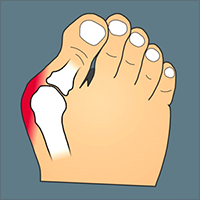 When it comes to bunions, the enlargement of the joint in the big toe, there are many facts and myths. For example, it is a fact that bunions are one of the most common foot problems in the United States and occur in nearly one fourth to one third of Americans. Myths of bunions include having surgery even if the bunion is not painful, bunion surgery is unbearably painful, and in order to have a successful surgery you would have to take off of work for a prolonged period of time.
When it comes to bunions, the enlargement of the joint in the big toe, there are many facts and myths. For example, it is a fact that bunions are one of the most common foot problems in the United States and occur in nearly one fourth to one third of Americans. Myths of bunions include having surgery even if the bunion is not painful, bunion surgery is unbearably painful, and in order to have a successful surgery you would have to take off of work for a prolonged period of time.
Bunion sufferers should only have surgery on a painful bunion if the joint continues to grow and when it creates a problem when engaging in physical activity.
Bunions can become a serious condition if not treated properly. If you want to better understand the facts and myths of your foot problem contact podiatrist Dr. Sharon L. Pletcher of New York. Our doctor will treat your foot and ankle needs.
What is a Bunion?
A bunion is formed of swollen tissue or an enlargement of boney growth, usually located at the base joint of the toe that connects to the foot. The swelling occurs by the bones in the big toe shifting inward, which impacts the other toes of the foot. This causes the area around the base of the big toe to become inflamed and painful.
Why do Bunions Form?
- Genetics – susceptibility to bunions are often hereditary
- Stress on the feet – poorly fitted and uncomfortable footwear that places stress on feet, such as heels, can cause bunions to form
How are Bunions Diagnosed?
Doctors often perform two tests – blood tests and x-rays – when trying to diagnose bunions, especially in the early stages of development. Blood tests help determine if the foot pain is being caused by something else, such as arthritis, while x-rays provide a clear picture of your bone structure to your doctor.
How are Bunions Treated?
- Refrain from wearing heels or similar shoes that cause discomfort
- Select wider shoes that can provide more comfort and reduce pain
- Anti-inflammatory and pain management drugs
- Orthotics or foot inserts
- Surgery
If you have any questions please feel free to contact our office located in State College, PA. We offer the newest diagnostic tools and technology to treat your foot and ankle needs.
Read more about bunions.




